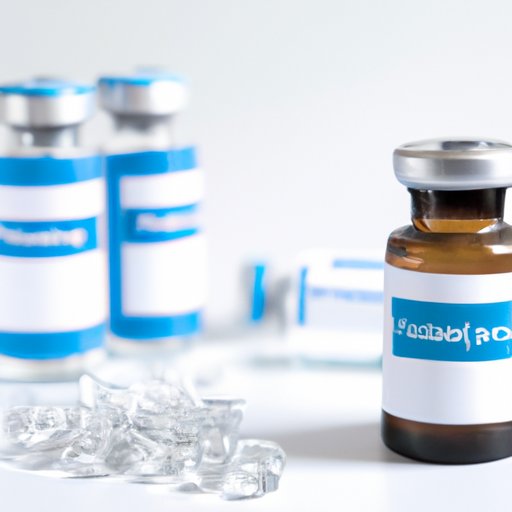
I. Introduction
Chickenpox and shingles are two conditions caused by the same virus. While chickenpox is a common childhood infection, shingles often occurs later in life. Many people wonder whether having chickenpox makes them more likely to get shingles. In this article, we’ll examine the connection between chickenpox and shingles and what you need to know to protect yourself.
II. The Connection between Chickenpox and Shingles: What You Need to Know
Chickenpox is a highly contagious viral infection that causes an itchy rash and fever. It’s caused by the varicella-zoster virus, which can also cause shingles. Shingles, or herpes zoster, is a painful rash that typically appears on one side of the body. Both chickenpox and shingles are caused by the varicella-zoster virus, but they have different symptoms and affect people at different ages.
Chickenpox can lead to shingles later in life because after the initial infection, the virus remains dormant in your body and can reactivate years later. When the virus reactivates, it causes shingles. Shingles occurs when the varicella-zoster virus reactivates in the nerve cells near the spinal cord, causing a painful rash or blisters.

III. Exploring the Link between Chickenpox and Shingles Outbreaks
Shingles outbreaks occur when the varicella-zoster virus reactivates in the body. While anyone who has had chickenpox can develop shingles, the risk of shingles increases with age because the immune system weakens over time. People with weakened immune systems due to medical conditions such as HIV/AIDS or cancer are also at higher risk of developing shingles.
The virus can also reactivate if the immune system is compromised by stress, injury, or even certain medications. Once the virus reactivates, it travels along the nerve fibers to the skin, causing the characteristic rash or blisters.
IV. Can You Really Get Shingles from Chickenpox? Here’s What the Experts Say
If you have had chickenpox, you could develop shingles later in life. The likelihood of developing shingles after having chickenpox varies, but most people who have had chickenpox do eventually develop shingles. Shingles outbreaks usually occur in people over the age of 50, although they can occur in younger people too.
The chickenpox vaccine has also been shown to reduce the risk of shingles. While the vaccine doesn’t guarantee complete protection against shingles, it can reduce the severity of symptoms if you do develop the condition.
V. The Chickenpox Vaccine and How It Can Prevent Shingles Later in Life
The chickenpox vaccine is a safe and effective way to prevent chickenpox. It works by exposing your body to a small amount of the varicella-zoster virus, which helps your immune system build immunity to the virus without getting sick. The vaccine is recommended for children between 12 and 15 months of age and requires two doses for maximum protection.
Studies have shown that the chickenpox vaccine can also reduce the risk of shingles later in life. People who receive the vaccine have a lower risk of developing shingles and are less likely to experience severe symptoms if they do develop shingles.
VI. Shedding Light on the Relationship Between Chickenpox and Shingles
While chickenpox is the main cause of shingles outbreaks, it’s possible to develop shingles even if you’ve never had chickenpox. In these cases, the virus is thought to enter the body through contact with someone who has chickenpox or shingles. However, this is rare and most cases of shingles are caused by reactivation of the chickenpox virus.
To reduce your risk of developing shingles, it’s important to maintain a healthy lifestyle and manage chronic conditions such as diabetes and heart disease. You should also talk to your doctor about the shingles vaccine if you’re over 50 or have a weakened immune system.
VII. From Chickenpox to Shingles: What Happens to Your Body
After a person recovers from chickenpox, the virus remains dormant in the body. When the virus reactivates, it causes shingles. Shingles usually begins with a burning or tingling sensation in one area of the body, followed by a rash or blisters. The rash typically appears on one side of the body, often in a stripe or band-like pattern.
The rash can be very painful and is usually accompanied by other symptoms, such as fever, headache, and fatigue. It can take several weeks for the rash to heal, and some people may experience long-term nerve pain or complications such as vision loss.
VIII. Understanding the Risk Factors and Prevention Strategies for Shingles after Childhood Chickenpox
Some factors that increase the risk of developing shingles include age, weakened immune system, and a history of chickenpox. Smoking, stress, and certain medications can also increase the risk of shingles.
To reduce your risk of developing shingles, you should maintain a healthy lifestyle, manage chronic conditions, and talk to your doctor about the shingles vaccine if you’re over 50 or have a weakened immune system.
If you do develop shingles, your doctor may prescribe antiviral medications to reduce the severity of symptoms and prevent complications. They may also recommend pain relief medications or other treatments to help manage pain and other symptoms.
IX. Conclusion
In conclusion, chickenpox and shingles are caused by the same virus, and having chickenpox can increase your risk of developing shingles later in life. However, the risk of developing shingles can be reduced through lifestyle changes, managing chronic conditions, and getting vaccinated. If you do develop shingles, seeking medical treatment early can help reduce the severity of symptoms and prevent complications.
So, be sure to talk to your doctor about the chickenpox vaccine and the shingles vaccine to protect yourself and reduce your risk of developing these conditions.





